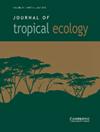Golden-bellied mangabeys (Cercocebus chrysogaster) consume and share mammalian prey at LuiKotale, Democratic Republic of the Congo
IF 1
4区 环境科学与生态学
Q4 ECOLOGY
引用次数: 2
Abstract
Predator–prey dynamics are an important aspect of community ecology, but predation events are often difficult to observe. Among African primates, observations of mammal predation are particularly uncommon and generally restricted to a few ape and cercopithecoid species. I report five observations of mammal predation by golden-bellied mangabeys (Cercocebus chrysogaster) living in rainforest at the LuiKotale study site, Democratic Republic of the Congo. Over 46 all-day follows, mangabeys from one group caught and consumed four duikers (Cephalophinae spp.) and one Alexander’s cusimanse (Crossarchus alexandri). Individuals begged from the feeding individual in three of five observations. I observed one successful attempt at begging, which resulted in an adult female tolerating removal of blue duiker by a juvenile. These are the first detailed observations of mammal predation and food sharing by Cercocebus mangabeys and suggest mammals that feed alongside mangabeys may balance predation risk against social foraging benefits. Food sharing is rarely observed in most cercopithecine monkeys and could provide a useful metric to examine socio-ecological patterns of food acquisition.在刚果民主共和国的LuiKotale,金腹白头猴(Cercocebus chrysogaster)正在吞食和分享哺乳动物的猎物
捕食者-猎物动力学是群落生态学的一个重要方面,但捕食事件通常很难观察到。在非洲灵长类动物中,对哺乳动物捕食的观察尤其罕见,通常仅限于少数类人猿和类人猿。我在刚果民主共和国LuiKotale研究点报告了生活在雨林中的金腹曼加贝(Cercocebus chrysoaster)对哺乳动物捕食的五次观察。在接下来的一整天里,有46只来自一组的曼加贝捕捉并吃掉了四只小飞燕属(Cephalophinae spp.)和一只亚历山大小飞燕(Crossarchus alexandri)。在五次观察中,有三次个体向喂食个体乞讨。我观察到一次成功的乞讨尝试,结果一名成年女性容忍了一名青少年将蓝貂带走。这是首次对曼加贝Cercocebus mangabeys的哺乳动物捕食和食物共享进行详细观察,并表明与曼加贝一起觅食的哺乳动物可能会平衡捕食风险与社会觅食利益。在大多数尾猿中很少观察到食物共享,这可以为研究食物获取的社会生态模式提供一个有用的指标。
本文章由计算机程序翻译,如有差异,请以英文原文为准。
求助全文
约1分钟内获得全文
求助全文
来源期刊

Journal of Tropical Ecology
环境科学-生态学
CiteScore
2.10
自引率
0.00%
发文量
44
审稿时长
18-36 weeks
期刊介绍:
Journal of Tropical Ecology aims to address topics of general relevance and significance to tropical ecology. This includes sub-disciplines of ecology, such as conservation biology, evolutionary ecology, marine ecology, microbial ecology, molecular ecology, quantitative ecology, etc. Studies in the field of tropical medicine, specifically where it involves ecological surroundings (e.g., zoonotic or vector-borne disease ecology), are also suitable. We also welcome methods papers, provided that the techniques are well-described and are of broad general utility.
Please keep in mind that studies focused on specific geographic regions or on particular taxa will be better suited to more specialist journals. In order to help the editors make their decision, in your cover letter please address the specific hypothesis your study addresses, and how the results will interest the broad field of tropical ecology. While we will consider purely descriptive studies of outstanding general interest, the case for them should be made in the cover letter.
 求助内容:
求助内容: 应助结果提醒方式:
应助结果提醒方式:


